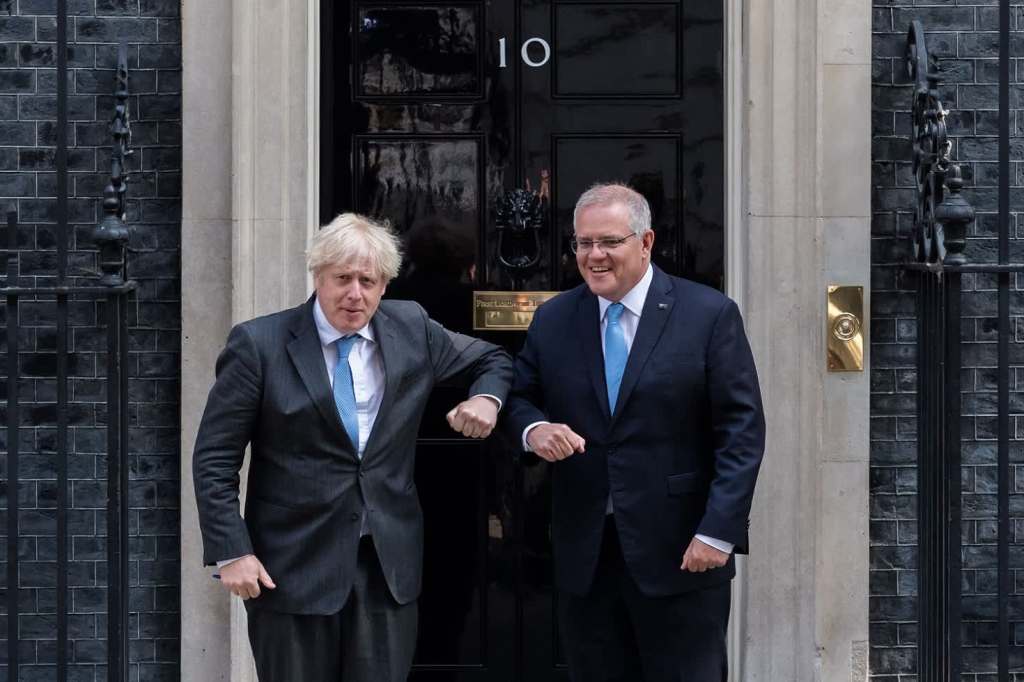Australia and the United Kingdom have struck a new free trade agreement. This is the first major free trade agreement that the UK has made with a foreign nation post-Brexit. The in-principle deal offers a gradual opening up of tariff-free access to the British market for Australian producers over the next 15 years. Working visas for young people between the two countries will also be liberalised.
Since Britain has left the European Union, striking new trade agreements with foreign allies has been a crucial part of ensuring the success of Brexit, something the UK has thus far failed to secure.
The deal was announced in a joint press conference between British Prime Minister Boris Johnson and Australian Prime Minister Scott Morrison. The focus was on this deal as a “foundational” agreement, described by Johnson as “a prelude to further deals.”
For Britain, this deal is designed to assist their entry to the Comprehensive and Progressive Agreement for Trans-Pacific Partnership (CPTPP) of which Australia and 11 other countries around the Pacific benefit.
The contents of the discussion included security, expanding diplomatic presence in the Pacific, climate change, technology, travel, and agriculture. It was described as a “win-win” for both nations.
Johnson appeared to push Morrison toward further climate change commitments, stating he was looking forward to hearing “more” from Australia at the Cop26 climate change conference in Glasgow, Scotland, in November.
Morrison appeared to steer around questions of climate commitment while Johnson actually committed Australia to achieving net-zero emissions by 2050 before correcting his answer with “preferably.”
“We want to work with Scott and Australia on the clean tech solutions,” Johnson said.
“I think what we both strongly believe is that you can have a green industrial revolution that drives high wage, high skill jobs.
“You can do both and that’s what we’re going to work on together.”
How Important Is This Deal?
It’s potentially huge. The deal had been in the works for months before Morrison flew over to the UK to announce the agreement and covers a huge range of topics and trade areas.
Johnson, in his trademark ‘simpleton’ routine, joked that the deal amounted to: “You give us Tim Tams, we give you Penguins.
“You give us Vegemite, we give you Marmite. We give you Burberry mackintoshes, and you give us RM Williams.
“We’ll be able to do even more, because we’re taking tariffs off,” Johnson concluded.
Morrison, in a slightly more sombre tone, spoke of the need for “liberal democracies” to work closely together in the modern era, an apparent nod to the growing tensions Australia is facing with China.
“Movement of people, movement of goods, movement of services. This is what underpins the strength of advanced economies and liberal democracies”.
Morrison, in providing context for the deal, made the comparison with Australia’s relationship with New Zealand as to how broad and co-operative the new arrangement with the UK could be.
“This is the most comprehensive and ambitious agreement that Australia has concluded,” Morrison said.
“The only one that comes into close connection with that is the one we have with New Zealand under the closer economic relationship we have there”.
What Does It Mean for Us?
Exact details of the deal have yet to be released but from what we can tell, it will be sweeping and affect exporters, manufacturers, producers, and travellers. It will also have a big impact on security and potentially our climate change ambitions.
Some of the biggest winners here are the agriculture sector. According to a press release form the Department of Foreign Affairs and Trade, 99% of Australian goods will have tariff reductions.
Wine and rice will be able to enter UK markets without tariffs. Beef and lamb tariffs will be eliminated after 10 years, with immediate access to tariff-free quotas of 35,000 and 25,000 tonnes respectively. These quotas will rise year on year over the next decade.
Similar conditions are in place for sugar and dairy.
Overall, it’s an big expansion on a trading relationship worth more than $25 billion last year, according to UK Government statistics.
There is concern in the UK that a flooding of the British market with cheap imports from Australia will be a betrayal of UK farmers. Concerns have also been raised that Australian animal welfare standards are not as strong as those in the UK.
Johnson addressed the issues raised by stating that the deal includes “The strongest possible provisions for animal welfare.”
For those wishing to live and work in the UK, Working Holiday visa’s have been extended to three years and granted to those up to the age of 35. Strengthened rights will also come with these new visas.
Johnson explained that the new deal would “Make it easier for British young people to go and work in Australia without the traditional compulsion of having to go and work on a farm for 80 days.”
“I wanted to extend it to 90 days but that turned out to be the wrong approach,” he joked.
The loss of British labour on farms across Australia could come as a heavy blow for an industry that is already struggling under the lack of foreign workers brought about by the pandemic.
Finally, the pressure from Johnson on Morrison to act more decisively on climate change could be the kind of external pressure we need in order to get the famously stubborn PM to shift his views on the policy.
Morrison has always championed a ‘tech not taxes’ approach to climate change, but Johnson’s commitment to a “green revolution” could further place Morrison in an uncomfortable position if he doesn’t try to steer our own country on a similar trajectory to that of our newly significant trading partner.
We’ll bring you further details on the agreement as they emerge.
Read more stories from The Latch and subscribe to our email newsletter.







